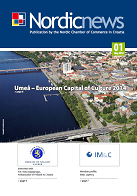Swedish Banks Make Money by Saying No to Cash
If you’re looking for Swedish cash, don’t go to a Swedish bank. Most of the country’s biggest lenders, SEB AB, Swedbank AB (SWEDA) and Nordea Bank AB (NDA), have stopped manual cash-handling services
in 65 percent to 75 percent of their local branches. They say cash is out as Swedes rely on credit cards, the Internet and mobile phones to make all their payments.
The country’s bank notes, which are adorned with images of famous Swedes including botanist Carl Linnaeus and will soon also feature legendary actress Greta Garbo, are only used in about 20 percent of shop transactions, according to data from the Swedish Trade Federation. In the U.K., whose capital London is a global hub for high finance, all banks still offer cash at their branches.
“We’ve removed the manual cash handling simply because we’re seeing a change in behavior among our customers,” Swedbank spokeswoman Anna Sundblad said in an e-mailed reply to questions. “Only 5 percent of our customers make over-the- counter cash transactions.”
Customer demand for cash services at Nordea, Scandinavia’s biggest bank, is dropping by about 20 percent a year, spokesman Erik Durhan said. According to Nordea Chairman Bjoern Wahlroos, the end of cash is a natural next step in an evolutionary process that has already led to the extinction of cheque books. In this respect, Scandinavia is far ahead of the U.K. and the U.S., he said.
Cheque Extinction
“The Nordic countries did away with the cheque about 30 years ago, whereas if you look at the U.S. you still pay by cheque, and even in Britain people still use cheques,” Wahlroos said in an interview last month. “It’s only logical that if we did away with the cheque 30 years ago, we’re starting to do away with coins and bills today.”
Sweden’s banks don’t only stand out for their aversion to paper money. The nation’s financial industry has performed better than banks across most of Europe since the debt crisis hit more than three years ago. Shares in Nordea have soared 22 percent this year, trouncing a 3.5 percent gain in the 40-member Bloomberg Index of European financial companies. Swedbank is up 19 percent and SEB has gained 24 percent.
The lenders are also among Europe’s best capitalized thanks to Sweden’s regulatory requirements, which far exceed standards set by the Basel Committee on Banking Supervision. The country’s biggest banks must set aside at least 10 percent in core Tier 1 capital of their risk-weighted assets this year, with the minimum requirement rising to 12 percent in 2015. Basel sets a 7 percent minimum by 2019.
Bank Robberies
The banks say removing cash-handling services is helping them cut costs. They’re also raising profits from their card business. SEB’s reported fee income from its card operations rose 8 percent to 4.37 billion kronor ($683 million) for last year. SEB has completely shut down 70 percent of its manual cash handling services in Sweden, spokeswoman Anna Helsen said.
Of Sweden’s four biggest banks, Svenska Handelsbanken AB (SHBA) is the only one still offering cash-handling services at all its 461 branches. It will continue to do so as long as there is demand, said Henrik Westman, a spokesman for the bank.
That customer service comes at a price. Most of the recent reported bank robberies in Sweden were at Handelsbanken branches. Overall in Sweden, steps by other banks to remove cash from their branches have led to a decline in robberies, with only five incidents last year, compared with 16 in 2011, according to the Swedish Bankers’ Association.
Cost of Cash
The Financial Sector Union of Sweden, which represents employees in the country’s financial industry, is pushing to get rid of cash altogether, a step it says will make banking safer.
The cost of keeping cash amounted to 0.26 percent of Sweden’s gross domestic product in 2009, compared with 0.19 percent for credit cards and 0.09 percent for debit cards, according to a KTH Royal Institute of Technology report published in January.
Shops are also trying to cut their use of paper money. Swedish bedding retailer Kungsaengen and mobile phone chain 3 are phasing out cash in their stores. So is TeliaSonera AB (TLSN), which stopped accepting cash payments in its Swedish stores in September, said spokesman Nicolas Rundbom.
Airport Tellers
At Sweden’s main Arlanda airport, travelers can only use automatic tellers to purchase train tickets to Stockholm if they have credit cards with a chip. Passengers with chipless cards, or cash only, are forced to queue up at old-fashioned tellers.
In Germany, Europe’s largest economy, even international chains such as Ikea and Saturn don’t accept Visa or MasterCard in their outlets -- only cash and Germany’s so-called EC cards.
In the U.K., cash was used in 58 percent of all retail transactions in 2011, up from 55 percent in 2010. Payment with credit cards fell 11 percent, according to data from the British Retail Consortium.
In Sweden, the number of card payments “is increasing continuously and for 10 years we’ve seen strong growth, which we expect will continue,” said Bengt Nilervall, head of payments at the Swedish Trade Federation. “Many European countries are far behind.”
Source: www.bloomberg.com, 11 April 2013


























